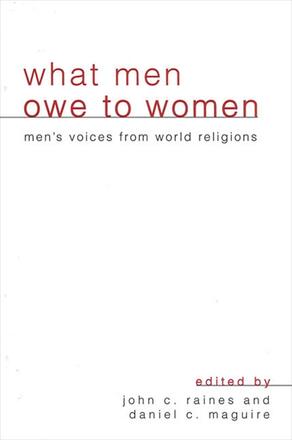
What Men Owe to Women
Men's Voices from World Religions
Alternative formats available from:
Men from a wide range of traditions discuss gender justice in world religions.
Description
What Men Owe to Women brings together a distinguished group of male scholars to address gender justice in world religions. It includes contributions representing a wide range of traditions: Islam, Judaism, Hinduism, Roman Catholicism, Protestantism, Taoism, Buddhism, and African and Native American religions. This book acknowledges the patriarchal overload of these traditions and institutes a creative search for the helpful, but neglected, resources of the traditions themselves. The contributors show how these resources support the economic and political empowerment of women and assist a rethinking of gender relations in terms of genuine mutuality. In addition they share information on their own lives and those of the women in their families that illuminate the discussion.
The book builds upon the enormous international feminist literature that has indicted the religions of the world for their insensitivity to women and their sacralization of sexism. It then looks into the causes of the fear that underlies much sexism and studies the distortion of religious symbols that supports sexism and masks men's obligations.
Contributors include, Marvin M. Ellison, Asghar Ali Engineer, Farid Esack, Ze'ev W. Falk, Christopher Ronwanièn:te Jocks, Daniel C. Maguire, Mutombo Nkulu-N'Sengha, Tavivat Puntarigvivat, John C. Raines, Gerard S. Sloyan, Anantanand Rambachan, and Liu Xiaogan.
John C. Raines is Professor of Religion at Temple University. He is the coauthor, with Donna C. Day-Lower, of Modern Work and Human Meaning. Daniel C. Maguire is Professor of Ethics at Marquette University. He is the author of Death by Choice and The Moral Core of Judaism and Christianity: Reclaiming the Revolution, coauthor, with Larry Rasmussen, of Ethics for a Small Planet, and coeditor, with Harold Coward, of Visions of a New Earth: Religious Perspectives on Population, Consumption, and Ecology, the latter two also published by SUNY Press.
Reviews
"Since the early 1970s we have heard the voices of women detailing the gender inequities long prevalent in the world's religions. In this book, they are at last joined by a formidable collection of male scholars who know their traditions intimately. Reflecting on these traditions—ranging from Hinduism, Buddhism, Orthodox Judaism, Taoism, Islam, African and Native American religions to Protestantism and Catholicism—each man finds useful resources for gender equality. A few go further and provide insightful critiques of the contemporary economic and social reality that makes the need to work for social justice for women essential for the survival of religion itself. What Men Owe to Women should be both a resource and a springboard for further discussion. Women as well as men need to know what it says, then add their own experience and views to a subject critical to contemporary life as well as religion. " — National Catholic Reporter
"The astonishing point that comes across loud and clear in this book, is that diverse religious traditions have long been held hostage to patriarchal visions and authority. Seeing the diverse cultural evolutions side-by-side emphasizes the similar yet different ways traditions were fashioned by the hands of men. From a comparative religions perspective, this book sheds much light on the varying interpretive strategies employed by religions as they work toward a similar (and suspect) end. " — Kathryn Kueny, Lawrence University